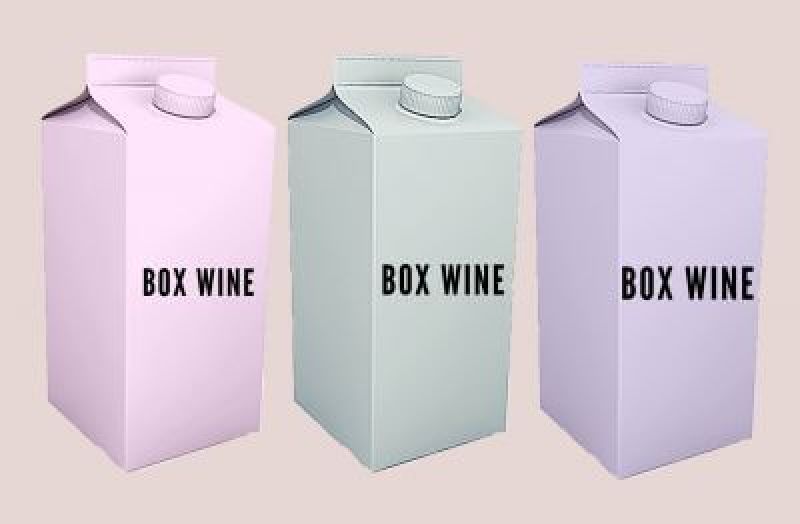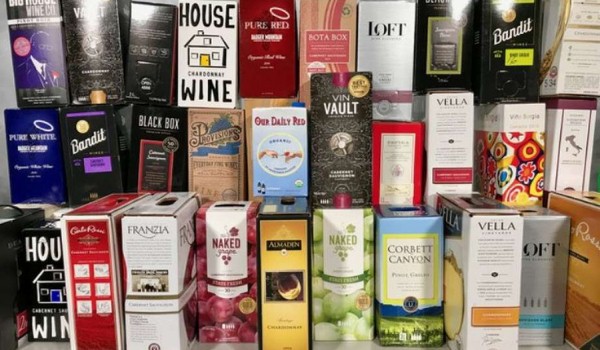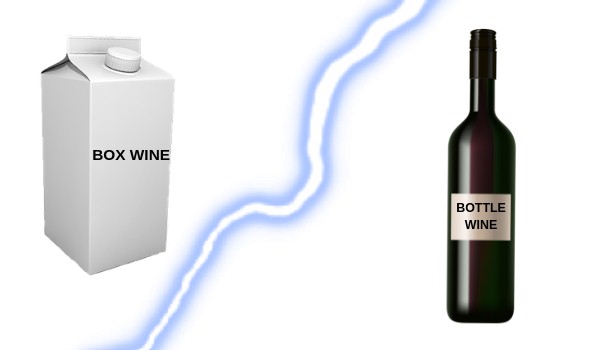Educating Sommeliers Worldwide.
By Beverage Trade Network

There’s a stigma that’s drilled into everyone’s brain about box wine - its low quality. But is it really low quality? Everything that is on the cheaper side is automatically taken into consideration as low quality, or ‘not good enough’, especially in the world of wine. But surprise, that isn’t the case, especially when it comes to box wine.
It’s exactly what the name says it is - Box wine is wine in a box. Well, technically it’s wine in a bag-in-box (BIB). Wine is contained in a plastic bladder typically with an air-tight valve emerging from a protective corrugated fiberboard box.
So if you were ever worried that box wine isn’t safe, don’t worry, it’s not placed directly in a cardboard box, so it’s pretty safe to drink that way.
Box wine might seem something that is recent, but it’s been around for years. Thomas Angove, a winemaker from Renmark, South Australia is the brains behind the whole ‘box wine’ anthem. He went ahead and patented his company in 1965, on April 20 to be exact.
The original design for box wines requires the consumer to snip off the corner of the plastic bladder, pour out the wine, and then reseal it with a special category peg. This peg was based off of an already existing product on the market, which was what mechanics used to hold and transport battery acid.
An air-tight tap which was welded to a metallised bladder was patented in 1967 by Australian inventor Charles Malpas and Penfolds Wines, making storage much more convenient than the constant resealing. All modern wine casks now use some kind of plastic tap, which is usually exposed by tearing apart an inner layer of a perforated panel on the box.
During the first few decades, box packaging was usually preferred by producers that made less expensive wines as it is cheaper to produce compared to the regular glass bottles. However, in 2003, Black Box Wines introduced premium wines in box packaging form, beating the stigma that boxed wines are the cheap, lower quality wines. Within the next few years, premium wineries, bottlers, and companies started packaging their own premium wines in boxes.

The stereotype that box wine is bad because it’s cheaper, is well, just a stereotype.
As the years have gone by, box wine is becoming more of a norm rather than something looked down at. However, that is only the case with people who know a lot about wine. The average wine consumer still related box wine with low quality wine.
You might be wondering if premium wines are packaged in a box, how are box wines still that cheap and affordable. The main reason box wines are cheaper is because the raw material used to produce box wine packaging costs less than that of the material used to make glass packaging. This doesn’t mean that the quality is compromised in box wine.
Superstores such as Target, French Rabbit, Walmart, and more, have their own selection of box wines which include both premium wines, and slightly lower quality wines.
The quality of a certain wine solely depends on the drinker. Just like there are bottled wines which are of low quality, there are box wines that are of low quality as well. Again, this doesn’t mean all box wines are of bad quality.
The only way you can actually test the quality of a particular box wine is how you would test the quality of a regular bottle of wine; by giving it a chance to grace your wine needs.

There are pros and cons to everything, and there’s no harm in putting them to the test and seeing the comparison.
Bottled wines are pretty standard, however, there are pros and cons you could take into consideration before deciding the purchase you want to go ahead with.
Wine can age - which is necessary for certain types of wine, and ages wine is a delicacy
There are a plethora of options - bottled wine being the standard way of packaging wine, there are a lot of options available to satisfy all wine needs.
Trying something new is easier - since you get less wine from a bottle compared to a box, it will probably get over quicker, which will make you venture out and try something new.
It’s ideal to use a wine cooler - if your wine isn’t at the temperature you want it to be, you can easily use a wine cooler. Or you know, if you just want to be boujie.
The bottling process is bad for the environment, and a lot of glass is wasted during production as well.
Once it’s open, you have a certain amount of time to drink it. Bottled wine is usually its best when finished soon after opening. It’s not advisable to keep bottled wine in the fridge for over 3-4 days.
Transport can be an issue. Glass bottles are usually tough to carry around as there’s a constant fear that they might end up breaking in the process. That’s why everyone’s always extra careful about carrying them from one place to the other, even if it’s from your house to someone else’s house.
Now that you have an idea about the good and the bad about bottled wines, you have to take into consideration the pros and cons of Box Wine as well.
Once you pop the tap open, your wine can last for four to six weeks. This means you don’t have to rush to finish your wine, and you can easily enjoy it at your own time.
More for your money. Box wine is said to be equivalent to four bottles of wine, and if you go ahead to calculate the price, it definitely doesn’t cost as much as four bottles of wine.
Carrying it everywhere is much easier. You can easily put a box in your bag or in the front seat of your car without the fear of it crashing against something and pouring out everywhere.
It’s a plus for the environment. A box takes less energy to produce than a bottle. It’s also recycled easier, and produced and shipped for a cheaper price than bottled wine, making is much easier on the environment.
Box wine can’t be aged. If you’re someone who loves your aged wine, then it’s best not to go for a box wine as box wine can only last up to two years when unopened.
There isn’t much of a selection. Since box wine isn’t a norm, not a lot of wineries and brands go along with it. Therefore, there isn’t much of a selection to pick from, especially if you’re a wine enthusiast who likes to go ahead and pick something different each time.
Wine coolers are a big no-no. The sad thing about box wine is that they’re not wine cooler supportive, so the fridge is your best friend in this case.
We obviously can’t tell you if you should go for bottled wine or box wine, which solely depends on you. However, we can erase the stigma of “box wines are low quality” from your head so you have options, and well, you never know, you might find your new favourite wine in a box.
"While I also have plenty of beautiful unique wines in my cellar, those are for evenings with friends and thoughtful meals. When I get home from work or settle in to watch an episode of A Handmaids Tale after the kids go to bed, a glass of wine from the box is exactly what I am having. I typically only have one glass — why open a bottle when the box will stay fresh for up to 30 days opposed to three? It's a much more sustainable option. With sustainability on everyone's minds, a lot more winemakers are giving us options” said Lindsey Ofcacek, wine director at 610 Magnolia in Louisville, KY and co-founder and executive director of The Lee Initiative.
Box wine, or Bottled wine, it’s still wine that one can enjoy whenever they want. It just depends on what you’d like to pick up for the night.